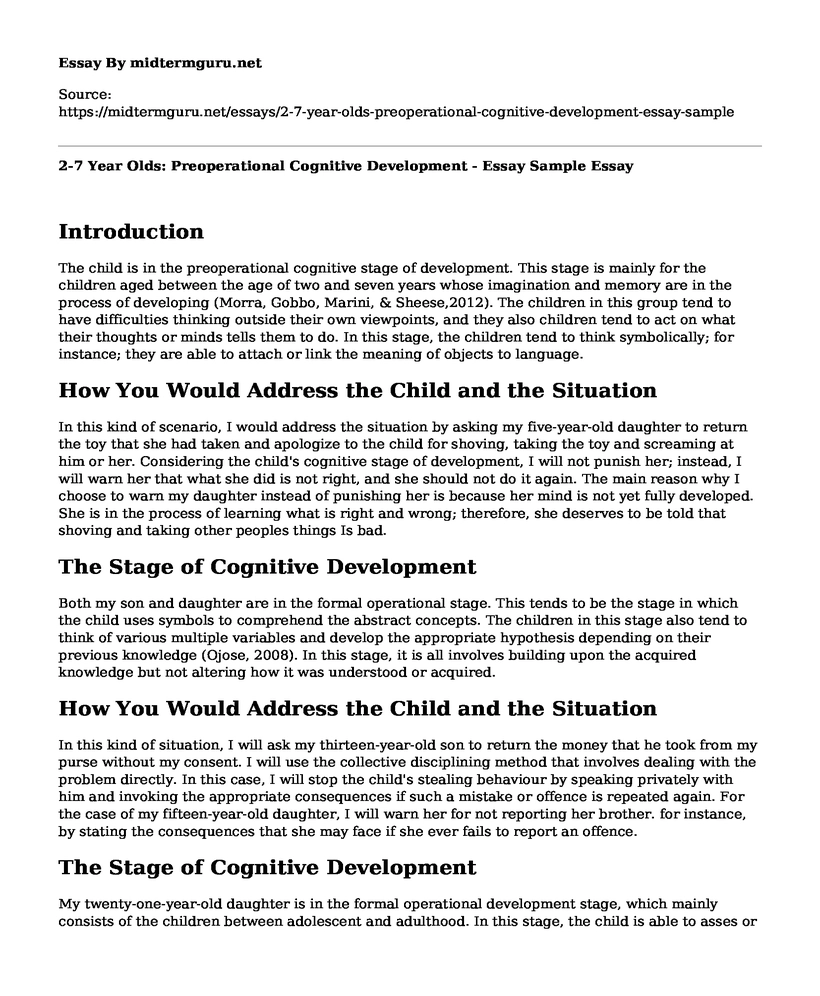Introduction
The child is in the preoperational cognitive stage of development. This stage is mainly for the children aged between the age of two and seven years whose imagination and memory are in the process of developing (Morra, Gobbo, Marini, & Sheese,2012). The children in this group tend to have difficulties thinking outside their own viewpoints, and they also children tend to act on what their thoughts or minds tells them to do. In this stage, the children tend to think symbolically; for instance; they are able to attach or link the meaning of objects to language.
How You Would Address the Child and the Situation
In this kind of scenario, I would address the situation by asking my five-year-old daughter to return the toy that she had taken and apologize to the child for shoving, taking the toy and screaming at him or her. Considering the child's cognitive stage of development, I will not punish her; instead, I will warn her that what she did is not right, and she should not do it again. The main reason why I choose to warn my daughter instead of punishing her is because her mind is not yet fully developed. She is in the process of learning what is right and wrong; therefore, she deserves to be told that shoving and taking other peoples things Is bad.
The Stage of Cognitive Development
Both my son and daughter are in the formal operational stage. This tends to be the stage in which the child uses symbols to comprehend the abstract concepts. The children in this stage also tend to think of various multiple variables and develop the appropriate hypothesis depending on their previous knowledge (Ojose, 2008). In this stage, it is all involves building upon the acquired knowledge but not altering how it was understood or acquired.
How You Would Address the Child and the Situation
In this kind of situation, I will ask my thirteen-year-old son to return the money that he took from my purse without my consent. I will use the collective disciplining method that involves dealing with the problem directly. In this case, I will stop the child's stealing behaviour by speaking privately with him and invoking the appropriate consequences if such a mistake or offence is repeated again. For the case of my fifteen-year-old daughter, I will warn her for not reporting her brother. for instance, by stating the consequences that she may face if she ever fails to report an offence.
The Stage of Cognitive Development
My twenty-one-year-old daughter is in the formal operational development stage, which mainly consists of the children between adolescent and adulthood. In this stage, the child is able to asses or judge a particular issue and come up with the most appropriate or suitable solution (Demetriou, Shayer, & Efklides, 2016). The children in the formal operational stage are usually focused on building their knowledge but not altering how it should be acquired.
How You Would Address the Child and the Situation
In this scenario, I will address the situation through first hearing her out. I will listen to her thoughts, the decisions that she intends to take and the reason why she intends to take that decision. After listening to her, I will advise her on the risks of making the decision to throw away her career. I will also advise her to focus on her lifetime goals and dreams instead of throwing them away so that she can get married.
References
Demetriou, A., Shayer, M., & Efklides, A. (2016). Neo-Piagetian theories of cognitive development: Implications and applications for education. Routledge. https://doi.org/10.4324/9781315640372
Morra, S., Gobbo, C., Marini, Z., & Sheese, R. (2012). Cognitive development: neo-Piagetian perspectives. Psychology Press. https://doi.org/10.4324/9781410618092
Ojose, B. (2008). Applying Piaget's theory of cognitive development to mathematics instruction. The Mathematics Educator, 18(1). Retrieved from http://tme.journals.libs.uga.edu/index.php/tme/article/download/193/180
Cite this page
2-7 Year Olds: Preoperational Cognitive Development - Essay Sample. (2023, Feb 03). Retrieved from https://midtermguru.com/essays/2-7-year-olds-preoperational-cognitive-development-essay-sample
If you are the original author of this essay and no longer wish to have it published on the midtermguru.com website, please click below to request its removal:
- Essay Sample on Causes and Effects of Dropping Out of College
- Group Discussion and Presentation Reflection Essay
- Paper Example on Effects of the Plow on Society
- Eating Pork Is Morally Unacceptable - Argumentative Essay
- America's Color Line: How Immigration and Intermarriage Shifted the Landscape - Essay Sample
- Early Childhood Interest in Law - Essay Sample
- High School vs College: Comparing Education Levels - Essay Sample







